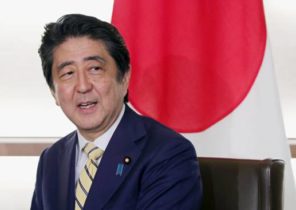
Trade agreement for several years held a Central place in American politics. The idea that the revision of trade agreements “will once again make America the great” due to the significant increase in the number of jobs and economic growth within the country, contributed to the rise of Donald trump in the White house.
In a broader sense, the idea that prisoners in the past the agreement has harmed the American middle class and that the TRANS-Pacific partnership (Trans-Pacific Partnership) will cause even greater damage today is supported by many representatives of both major political parties in the United States.
As once said the Senator Daniel Moynihan (Daniel Patrick Moynihan), the participants of a political debate have the right to have their own opinion, but not their own facts. In fact, the impact of trade and globalization on income is a controversial issue, and it may be significant. However absurd is the idea that trade agreements of the United States the previous generation led to a significant impoverishment of the country.
Have to hold the debate on the impact of globalization on middle-class incomes and inequality. Growing imports led to the displacement of jobs. The company got the opportunity to tighten the terms of contracts with the workers, especially in those sectors where there are no trade unions, and for this purpose we used the threat that their jobs may be transferred to another location. The emergence of global supply chains has changed the structure of production in the United States.
In my opinion, this effect is much less than the impact of technological progress. This assessment is based on the results of various studies on the experience of the highly competitive Germany and the data on what proportion of American workers in the industrial sector is constantly decreasing during the last 75 years. I admit: global trends and new research suggests that the impact of trade on income is far more noticeable than a decade ago.
However, the assessment of the impact of trade on income is very different from assessment of trade agreements. Not to say that such a multilateral trade deal like the North American free trade agreement (NAFTA) have a significant impact on income and jobs in America, and the reason is simple: the American market is almost fully opened 40 years ago, even before entering into any agreements considered to be controversial.
For example, the American tariffs on Mexican goods, the average was about 4% prior to the entry into force of the agreement NAFTA. China had what is called a trading status of “most favoured nation” relations with the United States even before its accession to the world trade organization (WTO) and got the same status as the other countries. Prior to the conclusion of a free trade Agreement with Korea (the Korea Free Trade Agreement) U.S. tariffs for Korean goods was, on average, negligible to 2.8%.
The absence of the impact of trade agreements on competition in the import becomes obvious when you hear the main arguments against such agreements. They rarely — if at all it ever happens to take the form of allegations that we unduly reduce U.S. trade barriers. Their opponents are, rather, talking about that in relation to the various countries should be put forward various demands during the negotiations — on issues such as intellectual property, labor standards, dispute resolution, or manipulation of exchange rates. I’m sympathetic to criticism of the TRANS-Pacific partnership, but even if all of his critics would have been right, this would not justify the conclusion that the acquisition will increase the challenges facing the American middle class.
The reason for the increase in imports into the United States not associated with a reduction in trade barriers. Rather, it is that emerging markets actually develop. They increase its economic potential as a result of successful economic reforms and increased global integration. Such a development would occur as in the presence of trade pacts concluded by the United States, and in their absence, although such agreements are usually the impetus for reform. Because the United States is actually doing very little to reduce the barriers in our agreements, the incentives to reform are the most valuable content to influential foreign politicians along with political relations with the United States.
The truth that is often denied by both sides in this debate, is that such additional agreements as the TRANS-Pacific partnership, in General, are not significant for the fate of the middle class. The real strategic choice facing Americans is whether the purpose of the policy to ensure growth and prosperity of the economy rest of the world. And it can be formulated as — whether the United States is to protect the rest of the world from threats arising from slowing global growth and the creation of barriers for goods and people?
If that’s the way to accept an existing challenge, the solution seems obvious. Strategy of a return to the protectionism of the past and attempts to restrain the growth of other Nations is untenable and could lead to a downward spiral in the global economy. The correct approach is to maintain openness while simultaneously finding ways to assist those working inside the country who have found themselves out of work as a result of technical progress, trade and other calls.
Lawrence summers is “a University Professor” (Charles W Eliot university professor) at Harvard University. Previously, he headed the Ministry of Finance of the United States.







